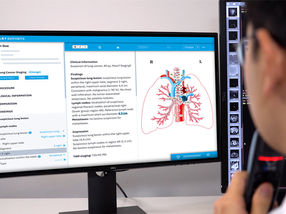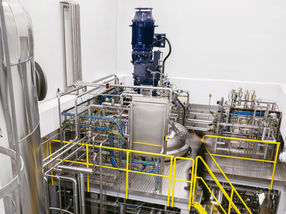Amersham, a leader in
medical diagnostics and in
Life Sciences, announced the in-licensing of a class of molecules from the University of Pittsburgh targeting amyloid plaque in the brain. Amersham's strategy is to identify a lead candidate for clinical evaluation as a PET (Positron Emission Tomography) diagnostic and monitoring agent for
Alzheimer's disease. Financial terms of this agreement have not been disclosed.
Other molecules in the class will also be utilized by Amersham's pharmaceutical company partners through the Company's Imanet(TM) network of imaging research centres to accelerate and facilitate the development of novel therapeutic drugs that target Alzheimer's Disease.
"The in-licensing of these molecules demonstrates our strategy of moving into key disease areas where there is both considerable medical need. Over several years, through our collaboration with the University of Pittsburgh, we have evaluated these molecules and have amassed a compelling body of pre-clinical and clinical data supporting their safety and utility. These molecules bind directly to amyloid plaque, which is key to tracking Alzheimer's Disease progression. We look forward to continued evaluation and selection of a lead candidate for clinical development. The potential commercialisation of an Alzheimer's diagnostic imaging agent for PET opens up the possibility of an earlier, objective diagnosis for Alzheimer's Disease, which would mark a dramatic advance for the patients and families affected by this condition," said Peter Loescher, President of Amersham Health.
"Up to now, amyloid plaque, which is implicated in Alzheimer's Disease progression, has been an unseen enemy. An Alzheimer's Disease PET diagnostic could accelerate the development of a wide range of therapeutics for the disease by enabling us, to definitively measure a potential therapy's ability to stop or reverse amyloid plaque deposits," said Dr. William Klunk, Associate Professor of
psychiatry, of the University of Pittsburgh.
"Our R&D efforts are focused around identifying the best product candidates - either internally or externally and moving these into
clinical trials as rapidly as possible. With regards to our Alzheimer's program, we have sought to in-license the molecules that we believe are the most promising in development," said Bill Clarke, MD, Executive Vice President, Research and Development, Amersham Health.
Initial preclinical development of these Alzheimer's PET molecules was first conducted by the University of Pittsburgh under the leadership of Dr. Chet Mathis, Professor of
radiology, and Dr. Klunk. Human studies were begun in February 2002 in collaboration with
Uppsala University,
Sweden, under the leadership of Dr. Bengt Langstrom. To date, in studies performed by the University of Pittsburgh, the University of Uppsala, and Uppsala Imanet AB, these molecules have been evaluated in approximately 40 human subjects. Uppsala Imanet AB is a joint venture between Amersham and the University of Uppsala and is within Amersham's international network of leading imaging research centres built principally around PET, which provide pharmaceutical companies with imaging solutions to accelerate their development of novel therapeutics.
PET is a rapidly growing nuclear
medicine imaging technology unequalled by other imaging methods in its ability to provide diagnostic information at the molecular level. PET scans can detect changes at the sub-cellular or molecular level, enabling doctors to see small tumors, signs of heart disease or
brain disorders such as Alzheimer's Disease, even before the disease symptoms manifest themselves. PET is currently the
gold standard for determining the viability of heart tissue for revascularisation, allowing doctors and physicians to determine whether bypass
surgery or transplant is the appropriate treatment.
Since PET can accurately monitor the progress of disease and a patient's response to treatment, the pharmaceutical industry is increasingly using PET to improve the speed and accuracy of evaluating the performance of new molecules in man, shortening times to bring new products to market and reducing risks in costly development programs. For patients, earlier diagnosis is improving opportunities for better treatment of cancer, heart disease and other
neurological disorders.

























































